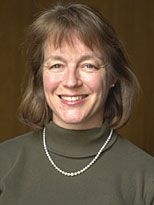Alice P. Gast, vice president for research and associate provost, has been appointed president of Lehigh University in Bethlehem, Pa. She will assume leadership there on Aug. 1, 2006.
"It is a tremendous honor to be asked to serve Lehigh University as its next president. I am extremely excited about the trajectory and momentum of this university. I will miss MIT and all the wonderful colleagues who have made my work here so gratifying, and I will carry with me some of the MIT culture of merit and excellence that permeates the Institute," Gast said.
MIT President Susan Hockfield described Gast as an "exceptionally talented academic leader and a wonderful colleague. Her leadership on issues relating to research policy and organization, faculty governance, and intellectual property, to name a few, is more than impressive, as is her ability to bring people with different interests together around a common agenda. All of these qualities will serve her -- and the university -- very well as Lehigh's next president."
A chemical engineer specializing in complex fluids and colloids, Gast came to MIT in 2001. She also served as the Robert T. Haslam Professor of Chemical Engineering.
In her administrative role, Gast coordinated policy regarding research and the licensing of copyrights and patents, and oversaw policies and processes regarding academic misconduct. Eighteen of the Institute's large, interdisciplinary research laboratories and centers as well as committees report to her office.
"From the start, MIT was so genuine and welcoming. I was impressed at how these extremely talented faculty were willing to roll up their sleeves and work together on tough problems," she said.
She cited the opening of the Institute for Soldier Nanotechnology (ISN) as an example of MIT's collaborative and innovative spirit. "Senior faculty self-assembled into a new organization. They wrote the proposal, designed a new facility and won the contract. It was a huge success!" she said.
MIT Provost L. Rafael Reif praised Gast for her "extraordinary job" in fostering new interdisciplinary initiatives, including ISN, and for her "wisdom and practical guidance" in areas including research policy, environmental safety and international scholarship in an "era of heightened security concerns."
A native of Texas who spent most of her life in California, Gast, 48, arrived at MIT just after Sept. 11, 2001, when the world and our nation's role in it were drastically altered. Since then, the regulatory environment has changed, especially for research universities, as attempts are made to restrict participation in some research to students of certain nationalities.
"My job is to make the research environment the best it can be. One of the great challenges that research universities face is finding that balance between security and openness. An important role for senior administrators is to fight this battle in Washington, D.C. MIT has been a leader in this area," Gast said.
Gast leads a research group that studies the physical and chemical processes governing the behavior of macromolecular liquids. The group aims to understand molecular forces and their influence on bulk properties through a combination of colloid science, polymer physics and statistical mechanics.
"My work has evolved from a materials focus to a more biological focus. Most recently, I've studied phenomena occurring in certain bacteria, where the cell membrane is fully coated with an organized layer of protein. It looks like a grid covering the cell's surface, and we are trying to understand how it works," she said.
Gast was selected as the 2006 winner of the American Chemical Society Award in Colloid and Surface Chemistry, a singular distinction, and she has received many other awards for her work. Yet, true to the MIT spirit, she counts graduate student mentoring as the "highlight of being a professor. We've discovered many interesting things in our research, but the main products of my academic career are my graduate students. I take great pride in helping them learn new methods of problem-solving," she said.
Gast was always interested in chemistry, physics and math. The daughter of a biochemist, she credits his influence along with frequent hikes with a California mountain-climbing club composed mainly of engineers with inspiring her to pursue engineering.
She continues to enjoy sports, including cross-country skiing and jogging with her daughter.
Gast joined the Stanford University faculty as a professor of chemical engineering in 1985 after earning her Ph.D. from Princeton University.
A noted teacher at Stanford, she is the co-author of a classic textbook on colloid and surface phenomena. Her scientific achievements have been recognized with an array of honors, including a Camille and Henry Dreyfus Teacher Scholar Award and the Allan P. Colburn Award of the American Institute of Chemical Engineers. She was elected to the National Academy of Engineering in 2001.
Gast received the B.S. in chemical engineering from the University of Southern California in 1980. She went on to earn an M.A. (1981) and Ph.D. (1984) from Princeton. Gast is a member of the American Association for the Advancement of Science, the American Chemical Society, the American Institute of Chemical Engineers and the American Physical Society.
Gast and her husband, a computer consultant, have two children.
A version of this article appeared in MIT Tech Talk on May 10, 2006 (download PDF).






